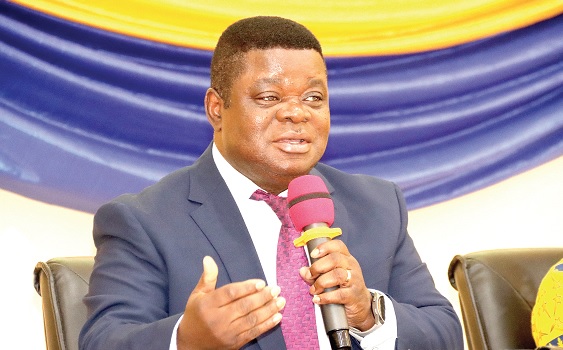
Take action on economic challenges - ISSER to government
The Institute of Statistical Social and Economic Research (ISSER) has challenged the government to take the necessary actions to drive the country out of the prevailing economic problems.
Advertisement
It said although the country had made some modest improvement in the macroeconomic indicators in recent times, more needed to be done to “turn the corner” for the better.
The institute said a fully turned economy would offer an acceptable interest rate, reduce inflation, stabilise the exchange rate for citizens and businesses to be able to plan, borrow, invest and be more profitable.
“So have we turned the corner? For me we have turned the first corner, but there are many more corners to turn,” the Director of the institute, Prof. Peter Quartey, said at the 2023 Mid-year Budget Review by the institute in Accra yesterday.
Context
The Minister of Finance, Ken Ofori-Atta, in the presentation of the Mid-year Budget statement in Parliament on July 31, 2023, said that the government had turned the corner with regard to some improvement in the economy.
He said the implementation of fiscal adjustments and sustained investments had contributed to the stabilisation of the economy.
The minister said since the 2023 Budget was presented to Parliament in November last year to date, the exchange rate had stabilised, inflation had softened and interest rates had declined, while plans for private investments had been announced due to increased investor confidence in the economy.
The statement had subsequently generated mixed reactions within the media space.
Other Trending Stories
While some citizens, especially the Minority in Parliament disagreed, others including the Majority in Parliament and government officials have supported the claims of the minister.
First corner
Prof. Quartey, however, said although there had been some relative improvement, the nation was not out of the woods yet.
For instance, inflation which jumped to 54.1 per cent in December 2022, had been reduced to 42.5 per cent in June 2023.
“When we travel and explain to our peers that Ghana’s inflation is around 45 per cent and interest rate is around 30 per cent, they laugh at us.
“We want to be at a point where we can all say comfortably that our economy has turned all the corners needed to be turned but at the moment, I do not think we have reached the optimal level yet,” the director said.
Touching on the 2023 fiscal outlook, Prof. Quartey said total revenue and grants were estimated at GH¢98.080 billion (15.9 per cent of GDP), GH¢1.238 billion higher than the 2022 mid-year fiscal policy review estimate of GH¢96.842 billion (16.4 per cent of GDP).
He said the projections aligned with the trend of revenue inflows, as well as the impact of the exchange rate depreciation of forex-related inflows such as oil and gas receipts.
Prof. Quartey also said that the expenditure (on commitment basis) was estimated at GH¢159.012 billion, this includes expenditure claims amounting to GH¢22.091 billion.
Of this amount, he said GH¢11.050 billion related to energy sector shortfalls due for 2022, while the remaining GH¢11.041 billion was on goods and services and domestic capital expenditure.
The outlook also estimates that about GH¢12.435 billion in outstanding payables from 2021 will be cleared by year-end.
However, owing to financing constraints, a payables build-up of GH¢28.520 billion, comprising the GH¢11.050 billion relating to energy sector shortfalls due for 2022, GH¢11.041 billion committed under goods and services and domestic capital expenditure, and GH¢6.746 billion reflecting GIFMIS payables were plausible by year-end.
The overall fiscal balance on commitment basis, therefore, is estimated at a deficit of GH¢60.932 billion (9.9 per cent of GDP), with a corresponding primary deficit of GH¢16.920 million (2.7 per cent of GDP).
On the other hand, the overall fiscal balance on cash basis is estimated at a deficit of GH¢44.846 billion (7.3 per cent of GDP) with a corresponding primary deficit of GH¢834 million (0.1 per cent of GDP).





